Leçon 10 - Parler du passé
Conversations
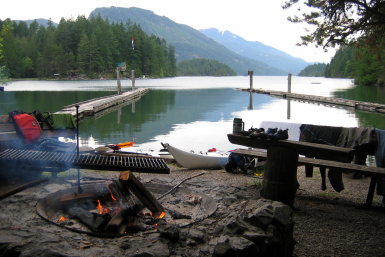
English
Eric phones Tom to tell him about his vacation at a nearby lake.
Eric: Hi Tom. How's it going?
Tom: Good. How was your vacation?
Eric: Great! We went hiking in the forest, and kayaking around the lake. We were very lucky with the weather, it was sunny and warm every day.
Tom: How many people were there?
Eric: There were five of us.
Tom: Where did you stay?
Eric: We rented a cabin at the south end of the lake. It was right on the lake, with a small beach in front. It came with a kayak and wood for the fire pit on the beach. I had such a great time that I want to go again next summer. Maybe you can come with us next time.
Tom: That sounds great!
Français
Eric téléphone à Tom pour lui raconter ses vacances au bord d'un lac voisin.
Eric: Bonjour Tom. Comment ça va?
Tom: C'est bien. Comment se sont passées tes vacances ?
Eric: Super! Nous avons fait de la randonnée dans la forêt et des kayaks autour du lac. Nous avons eu beaucoup de chance avec le temps, il était ensoleillé et chaud tous les jours.
Tom: Combien de personnes étaient là?
Eric: Nous étions cinq.
Tom: Où êtes-vous resté?
Eric: Nous avons loué une cabane à l'extrémité sud du lac. C'était juste sur le lac, avec une petite plage devant. Il est venu avec un kayak et du bois pour le foyer sur la plage. J'ai passé un si bon moment que je veux repartir l'été prochain. Peut-être que vous pouvez venir avec nous la prochaine fois.
Tom: Cela semble génial!
Vocabulaire et Phrases
 How many people were there?
How many people were there?
|
Combien de personnes étaient là? |
 at a nearby lake
at a nearby lake
|
au bord d'un lac |
 We went hiking in the forest, and kayaking around the lake.
We went hiking in the forest, and kayaking around the lake.
|
Nous avons fait de la randonnée dans la forêt et du kayak autour du lac. |
 beach
beach
|
plage |
 cabin
cabin
|
cabane |
 to phone
to phone
|
téléphoner |
 to tell
to tell
|
dire |
 fire pit
fire pit
|
un endroit pour contenir un feu |
 kayak
kayak
|
kayak |
 lucky
lucky
|
chanceux |
 to rent
to rent
|
louer |
 to come with
to come with
|
viens avec |
 south
south
|
sud |
 to stay
to stay
|
rester |
 vacation
vacation
|
vacances |
 wood
wood
|
bois |
Annonce
Weather
 weather
weather
|
conditions météorologiques |
 cloud
cloud
|
nuage |
 heat
heat
|
chaleur |
 rain
rain
|
pluie |
 snow
snow
|
neige |
 storm
storm
|
orage |
 sun
sun
|
Soleil |
 wind
wind
|
vent |
 How's the weather?
How's the weather?
|
Quel temps fait-il? |
 It's a beautiful day.
It's a beautiful day.
|
C'est une belle journée. |
 It's cold.
It's cold.
|
Il fait froid. |
 It's cool outside.
It's cool outside.
|
Il fait frais à l'extérieur. |
 It's foggy.
It's foggy.
|
Il ya du brouillard. |
 It's hot.
It's hot.
|
Il fait chaud. |
 It's humid.
It's humid.
|
C'est humide. |
 It's raining.
It's raining.
|
Il pleut. |
 It's snowing.
It's snowing.
|
Il neige. |
 It's stormy.
It's stormy.
|
C'est orageux. |
 It's sunny.
It's sunny.
|
Il fait soleil. |
 It's windy.
It's windy.
|
Il y a du vent. |
 It's very windy today.
It's very windy today.
|
Il y a beaucoup de vent aujourd'hui. |
 The weather's bad.
The weather's bad.
|
Le temps est mauvais. |
 The weather's nice.
The weather's nice.
|
Il fait beau. |
 It's supposed to be nice tomorrow.
It's supposed to be nice tomorrow.
|
C'est censé être bon demain. |
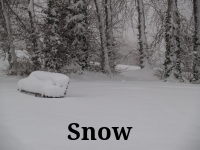
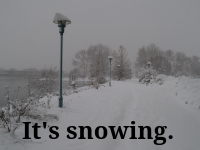
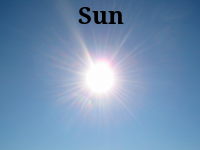

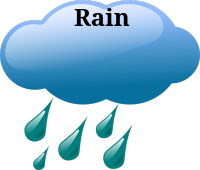
Flashcards
Voici quelques flashcards pour vous aider à apprendre à parler de la météo en anglais.
Grammaire
Past Tense of Verbs
'The past tense' des verbes, également appelé 'the simple past tense', décrit une action, un événement ou un état émotionnel qui s'est produit dans le passé. La plupart des verbes forment 'the past tense' en ajoutant le suffixe ed à la fin d'un verbe. Par exemple 'the past tense' de walk est walked.
Exemples
| I walked to the park yesterday. | J'ai marché au parc hier. |
| She talked about her vacation. | Elle a parlé de ses vacances. |
| He closed the door. | Il a fermé la porte. |
| They talked about the cabin. | Ils ont parlé de la cabane. |
| We hoped for the best. | Nous espérions le meilleur. |
| The clouds drifted away. | Les nuages se sont éloignés. |
Irregular Verbs in the Past Tense
De nombreux verbes très courants en anglais ont un 'past tense' irrégulier. Cette leçon aborde quelques-uns de ces verbes irréguliers très courants. La prochaine leçon abordera également d'autres verbes irréguliers.
To Be
Le verbe be est le plus irrégulier en anglais. Il a deux formes du 'past tense'. Le tableau suivant montre le passé pour le verbe be.
| I was | j'étais |
| he was | il était |
| she was | elle était |
| it was | il/elle était |
| we were | nous étions |
| you were | tu étais, vous étiez |
| they were | Ils étaient |
Exemples
| I was at the store. | J'étais au magasin. |
| He was tired. | Il était fatigué |
| They were happy. | Ils etaient heureux. |
| We were at home. | Nous étions à la maison. |
| Were they at the beach? | Étaient-ils à la plage. |
| They were not at the beach. | Ils n'étaient pas à la plage. |
| The car was dirty. | La voiture était sale. |
| The windows were dirty. | Les fenêtres étaient sales. |
Autres verbes irréguliers
Le tableau suivant montre des verbes très courants irréguliers dans 'the past tense'. Leçon 11 couvrira des verbes encore plus irréguliers.
| Verb | Past Tense | |
|---|---|---|
| do | did | faire |
| have | had | avoir |
| go | went | aller |
| sleep | slept | dormir |
| come | came | venir |
| give | gave | donner |
| find | found | trouver |
| think | thought | penser |
Exemples
| They went to the store last week. | Ils sont allés au magasin la semaine dernière. |
| He thought about it. | Il y réfléchit. |
| I slept all night. | J'ai dormi toute la nuit. |
| We did the work. | Nous avons fait le travail. |
| They found it. | Ils l'ont trouvé. |
| She found the book. | Elle a trouvé le livre. |
| I did the dishes. | J'ai fait la vaisselle. |
| They slept on the floor. | Ils ont dormi par terre. |
Questions and Negative Statements with the Past Tense
Pour les questions et les relevés négatifs, 'the past tense' du verbe assistant do est utilisé avec le verbe, similaire à la manière dont do est utilisé comme verbe assistant lors de la poser des questions ou de la fabrication déclarations négatives au 'present tense'.
Note: Did not est souvent raccourci à didn't.
Exemples
| Did they go to the store? | Sont-ils allés au magasin? |
| They did not go to the store. | Ils ne sont pas allés au magasin. |
| They didn't go to the store. | Ils ne sont pas allés au magasin. |
| Did you sleep all night? | Avez-vous dormi toute la nuit? |
| I did not sleep all night. | Je n'ai pas dormi de la nuit. |
| Did she find the book? | A-t-elle trouvé le livre? |
| She did not find the book. | Elle n'a pas trouvé le livre. |
| Did you buy it? | Est-ce que tu l'as acheté? |
| We did not buy it. | Nous ne l'avons pas acheté. |
| They did not do it. | Ils ne l'ont pas fait. |
Un très petit nombre de verbes, tels que be, n'utilisez pas de verbe d'assistance lors de la question ou de faire une déclaration négative. Les exemples suivants montrent comment poser des questions et faire des déclarations négatives avec le verbe be.
| Were you tired? | Tu étais fatigué? |
| I was not tired. | Je n'étais pas fatigué. |
| I wasn't tired. | Je n'étais pas fatigué. |
| Was the house for sale? | La maison était-elle à vendre? |
| The house was not for sale. | La maison n'était pas à vendre. |
| The house wasn't for sale. | La maison n'était pas à vendre. |
| Were the dishes clean? | La vaisselle était-elle propre ? |
| The dishes were not clean. | La vaisselle n'était pas propre. |
| The dishes weren't clean. | La vaisselle n'était pas propre. |
Annonce
Lire l’anglais
Chapter 1 - The Airport
Ana and Alejandro Martinez walk off the plane and into the airport. Both are tired from the flight, but also excited to be in a new country. They follow the crowd of people until they get to the lineup for customs. After about ten minutes, it is their turn to talk with the customs agent.
"Hello," Ana says as she gives the customs officer her passport.
"What is the purpose of your visit?" asks the customs officer.
"We are taking a course to help us improve our English."
"How long will you be staying in Vancouver?"
"We plan to stay until September fifth."
"Where are you staying?"
"We have friends who live here," Alejandro answered. "We met them when they visited our country. They invited us to stay with them for the summer, and recommended a course for us to take."
"What is your relationship?"
"Ana is my sister," Alejandro replied.
The customs officer gave them back their passports and said, "Enjoy your stay."
"Thank you", Ana and Alejandro said at the same time, then went to find their luggage.
They stood by the luggage carousel and waited for their luggage. "Is that your suitcase?" Ana said pointing at a black suitcase.
Alejandro looked at it. "I don't think so, but here is yours."
Ana grabbed her suitcase as it came by. A couple minutes later Alejandro got his suitcase as well.
"Now where do we go?", Ana asked.
"I think we need to go this way," Alejandro replied, pointing to the left.
They walked through a small passage and into a large waiting area.
"Alejandro! Ana!" they heard someone call.
Ana and Alejandro looked and saw their friends Sarah and Eric. They waved and walked over to them.
"Hi!" Sarah said. "How was the flight?"
"Long," said Alejandro. "But there were no problems."
"Let's go," Eric said, "We'll take you back to our house, and make dinner while you get settled in."
The four of them walked out of the airport, and into the sunny evening.
Vocabulaire anglais
| plane | avion |
| airport | aéroport |
| tired | fatigué |
| flight | vol |
| excited | excité |
| country | pays |
| crowd | foule |
| lineup | file, queue |
| customs | douane |
| minute | minute |
| purpose | objectif, raison |
| visit | visiter, visite |
| improve | améliorer |
| until | jusque |
| answers | réponses |
| summer | été |
| recommended | recommandé |
| relationship | relation |
| Enjoy your stay. | Profitez de votre séjour |
| luggage | bagage |
| suitcase | valise |
| grabbed | saisi |
| pointing | montrer du doigt |
| passage | passage |
| get settled in | s'installer |
Practice
Changez chaque phrase afin qu'elle utilise le passé.
Exemple - Question: I do the work. Réponse: I did the work.
| I want to go to the store. | |
| The boy is sad. | |
| She doesn't want a coffee. | |
| Do you have a pen? | |
| They walk to the park. |
Ecrivez sur vos vacances préférées ou des vacances que vous aimeriez faire.
Quiz
Faites l'examen en ligne pour voir si vous comprenez 'the past tense' en anglais.

